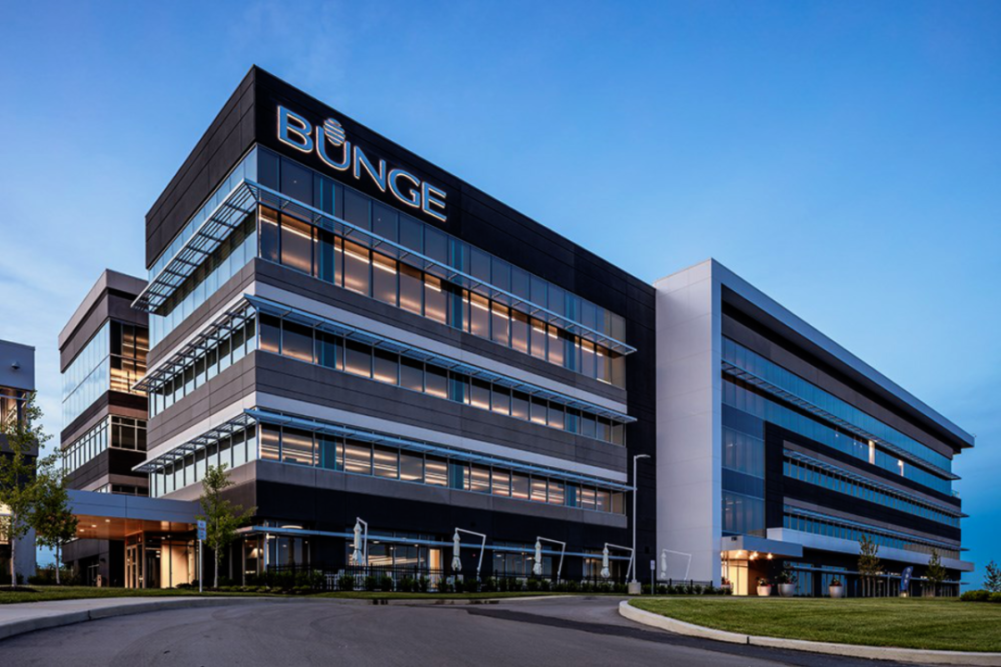ST. LOUIS — Building on momentum over the past several quarters, Bunge Ltd. delivered strong financial results in the first quarter of fiscal 2021, reaching a new high watermark for crush capacity utilization, and executing well in the marketplace through strong customer service, innovation and agility.
Bunge net income in the first quarter ended March 31 was $831 million, equal to $5.52 per share on the common stock, a sharp recovery from the first quarter of fiscal 2020, when the company sustained a loss of $184 million. Sales totaled $12.96 billion, up 41% from $9.17 billion in the first quarter of 2020.
On an adjusted basis, earnings per share were $3.13 in the first quarter of fiscal 2021, up from 91¢ in the same period a year ago.
The strong start to the year prompted Bunge to raise its full-year adjusted EPS forecast to approximately $7.50, up from the company’s earlier forecast of around $6.
Following the release of the strong financials, shares of Bunge climbed to a 52-week high of $89.13 before ultimately closing at $86.99, up 1.4% from the previous day’s close of $85.83.
"Our outstanding results in the first quarter reflect the fundamental strength of Bunge's platform and the benefits our integrated global approach bring to farmers and end customers,” said Gregory A. Heckman, chief executive officer. “Working together across value chains, our teams are capturing opportunities while effectively adapting to dynamic market environments. We remain focused on the safety of our employees and communities in the face of the ongoing pandemic, and we continue to serve changing consumer and business needs in the markets in which we operate. We are optimistic that the favorable demand environment in the first quarter will continue through 2021, and we are confident we have the right team and model in place to maintain our positive momentum.”
In late April, Bunge announced it would be changing its reporting segments to better align with its new value chain operating structure. Beginning with the first quarter 2021, Bunge will report Core Segment results as follows: Agribusiness, which includes processing and merchandising; Refined and Specialty Oils; and Milling. Bunge also will continue to report Corporate and Other results and Non-core Segment results, which is made up of Sugar & Bioenergy. The primary changes are elimination of the fertilizer reporting segment, the results of which are now included in the processing component of the Agribusiness reporting segment, the realignment of grains and oilseeds operations into processing and merchandising, as well as other immaterial reclassifications between Core and Corporate and Other segments.
During the first quarter of fiscal 2021, segment EBIT within Agribusiness totaled $836 million, which compared with a loss of $121 million in the same period a year ago. Sales increased 53% to $9.79 billion from $6.38 billion, while volumes rose to 36.36 million tonnes from 32.68 million a year ago.
“In processing, improved performance in the quarter was driven by higher results in all softseed and soy crush value chains, which included an increased contribution from US soybean origination,” John W. Neppl, executive vice president and chief financial officer, said during a May 4 conference call with analysts. “In addition, we achieved record Q1 soy and rapeseed crush volume capacity utilization, reflecting reduced unplanned downtime and excellent coordination between our commercial and industrial teams. This improved crush output brings immediate financial benefits, especially in periods of strong margins like we have been experiencing.
“In merchandising, improved volumes and margins in our global oils, corn and wheat value chains were primarily driven by increased export demand, strong grain origination in North America and Australia and outstanding execution of logistics and risk management.”
In the Refined and Specialty Oils segment, adjusted EBIT was $308 million, up sharply from $47 million a year ago. Sales were $2.73 billion, up from $2.33 billion, while volumes were 2.21 million tonnes, down from 2.35 million.
“The strong performance reflected higher results in all regions driven by improved execution as well as favorable market trends,” Mr. Neppl said. “Margins in North America refining benefited from early-stage recovery in foodservice and increased demand from the renewable diesel sector. Higher margins in South America and Europe more than offset lower volumes. Asia benefited from strong demand in India prior to the reimposition of restrictions due to the surge in new COVID cases.”
Milling segment EBIT totaled $8 million, down 56% from $18 million a year ago. Sales also were lower, falling to $390 million from $416 million. Volume fell to 1.74 million tonnes from 1.94 million.
“Results were down in both North and South America primarily due to lower margins,” Mr. Neppl said. “Additionally, volumes in Brazil were negatively impacted by the resurgence in COVID cases.”






